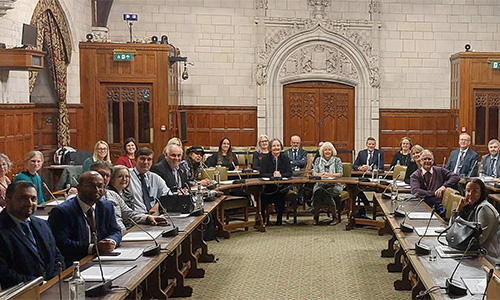Partner, Alan Collins in the Abuse Team attended the All Party Parliamentary Group (APPG) on Safeguarding in faith communities at the Palace of Westminster on 13 November 2023.

APPGs are informal, cross-party interest groups of MPs and Peers interested in a particular issue. They exist to help other MPs from all parties become better informed about a particular policy area. APPGs do not have any power to make laws and are not funded by Parliament. There is a great number and variety of APPGs, covering many areas such as health, education, transport, defence, faith, finance, the media and sports.
The APPG on Safeguarding in Faith Communities was established in July 2021. The aims of the group, are to increase awareness of issues relating to safeguarding within faith settings and to provide an opportunity for faith communities to inform safeguarding discourse, share best practice and work together to create safer places.
The work of the APPG has become particularly poignant in the wake of the Independent Inquiry into Child Sexual Abuse (IICSA) which published its report making series of recommendations in 2022.
One of IICSA’ recommendations was for Parliament to introduce a mandatory reporting law as to make it a legal requirement for child abuse to be reported to the authorities. There is no sign of this happening soon if at all.
At the AAPG meeting on 13 November there was a wide-ranging discussion on the need for a mandatory reporting law, and how we as individuals and collectively can try and influence the policy makers at Westminster to bring this about.
Sex offender name change
We also discussed sex offender name change with The Safeguarding Alliance who campaign for a law prohibiting sex offenders from changing their names. There is no law that prevents them to do so which enables offenders to fall off the radar on release from prison enabling them to stand a chance for example of obtaining employment with access to children.
We believe that it would be an easy step to frustrate offenders’ ability to deliberate disappear off the radar and that would be by ensuring that throughout the criminal justice process they are identified by their National Insurance number, which never changes, and could used when undertaking DBS checks and the like.
Conclusions
In our pursuit of creating safer environments within faith communities, the recent All Party Parliamentary Group (APPG) meeting on Safeguarding has shed light on crucial issues that demand our attention. The establishment of the APPG in 2021 reflects a collective commitment to raising awareness, sharing best practices, and influencing discourse to foster safeguarding within faith settings.
The recommendations of the Independent Inquiry into Child Sexual Abuse (IICSA) in 2022, particularly the call for a mandatory reporting law, emphasize the urgency of action. However, the absence of progress on this front necessitates a concerted effort on our part, both as individuals and as a collective, to influence policymakers at Westminster.
As advocates for safeguarding, we encourage you to join us in actively engaging with policymakers, urging them to prioritise the implementation of a mandatory reporting law.
Additionally, we draw attention to the issue of sex offender name changes, a loophole that compromises the safety of our communities. Support initiatives like The Safeguarding Alliance, which campaigns for laws preventing sex offenders from changing their names. Let us collectively advocate for identifying offenders through their National Insurance numbers throughout the criminal justice process, a simple yet effective step to ensure they remain accountable and do not fall off the radar upon release.
To stay informed and contribute to the ongoing dialogue on safeguarding in faith communities, follow the All-Party Parliamentary Group on Safeguarding in faith communities on social media and participate in relevant discussions.
We also discussed this issue in our podcast, HJ Talks About Abuse. Episode 61, the abuse team discuss a news report that hundreds of sex offenders are missing in the UK, some due to name changes.



